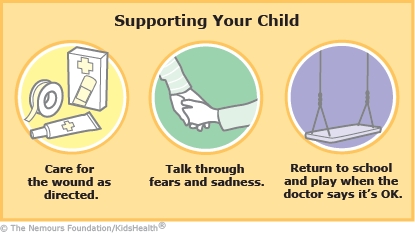A dog bit your child. A team of specialists that may have included a plastic surgeon and orthopedist (bone specialist) cared for your child while they were in the hospital. Since getting bitten by a dog can be very upsetting, a psychologist, therapist, social worker, or other mental health specialist may have talked to your child.
You can now care for your child at home. They will need your support as they recover. It's important to follow your health care provider's instructions so that the wounds continue to heal and don't get infected.


To help prevent infection:
Follow your health care provider's instructions for:

Your child:
You know your child best. If your child has symptoms that worry you or seems very sick, call your health care provider.

Your child is:

What problems can happen from a dog bite? Dog bites can cause scarring, and sometimes the germs that dogs have in their mouth can lead to infection. Your child may have had stitches and/or a skin graft (where healthy skin is taken from one part of the body to cover or replace damaged skin) to help the wounds heal and lessen scarring. They were also given antibiotics to prevent or treat an infection.
Rarely dog bites can lead to serious illnesses such as rabies or tetanus. If needed, your health care provider started treatment for rabies and gave your child a tetanus shot.
What else should I know about dog bites? After a child is bitten by a dog, they may be very afraid of dogs and want to avoid them, have nightmares, or show other signs of stress. If you had to put your pet down or send them to live somewhere else, your child also might be dealing with feelings of sadness and loss. Talking to a mental health provider can help your child cope with these feelings.
How can we prevent dog bites? To avoid dog bites, teach your child to:
If you own a pet, make sure it's up to date on all shots.